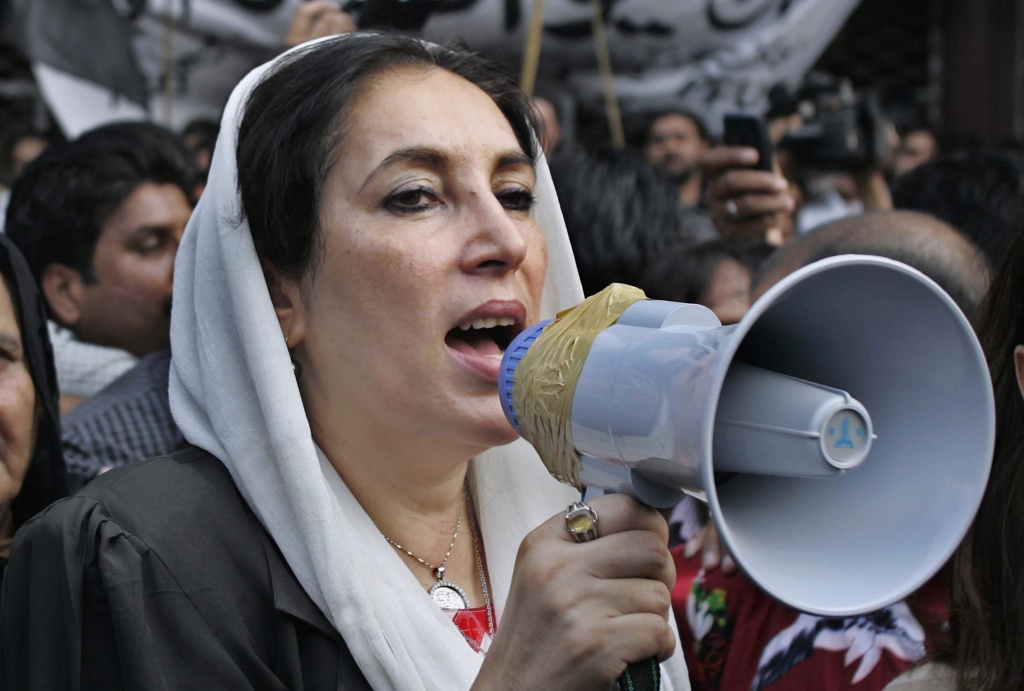Speeches & Interviews
Musharraf Can't Become President
Interview with Prabhu Chawla
For seven long years Benazir Bhutto has been dreaming of returning to Pakistan, the country she has served as prime minister twice. As she began finalising the details of her impending return to her homeland, the excitement was laced with uncertainty. Not surprising, since last week another former prime minister, Nawaz Sharif, who too was on a homecoming after eight years, was bundled from one airplane to another and banished to Jeddah in Saudi Arabia. The Pakistan People’s Party (PPP) leader spoke to INDIA TODAY Editor Prabhu Chawla for Aaj Tak. Excerpts from the interview.

I am very excited. Seven years is a long time and I am wondering what changes have taken place.
I don’t know how I will be received. But I am not in the same boat as him. He has been convicted by the court of law and sentenced for treason and tax evasion. He had traded his imprisonment for a 10-year exile in Saudi Arabia with his family and this involved foreign guarantees. I was given the same offer. But I refused. So unlike Nawaz Sharif, I cannot be put on a plane and sent out.
The corruption charges against me have not been withdrawn. As far as I am concerned, I am out on bail and should not be arrested. I stayed out so I would not lose my freedom of expression, freedom of speech, freedom of movement and association. Read the rest of this entry »
Interview of Mohtarma Benazir Bhutto by Karen
Lt General Kiani has a reputation as a professional officer which is what the armed forces and Pakistan need.
Our first step is to separate the offices of army chief and the President. General Musharaf has now given an undertaking to the Supreme Court of Pakistan that he will retire as army chief after the presidential elections this October. Under the present military doctored Constitution, the armed forces come under the President. The political parties would need to unite to bring control of the armed forces back to Parliament for reform to take place. PPP has signed a Charter of Democracy calling upon political parties to make the members of the armed forces answerable to Parliament, as they are in Washington, London and France, for greater transparency and accountability.
To prevent a return to the dysfunctional democracy of the nineties it is important to do away with the powers of the president to dismiss an elected parliament in his discretion. Secondly, there are other issues like lifting the military imposed ban on a twice elected prime minister contesting election for a third time for prime minister, appointment of Governors, members of the Judiciary and Election Commission. The Charter of Democracy spells out the changes needed.
These issues are part of our negotiations and will happen in a phased manner. Some steps have already been taken like arrangements for shedding military uniform, the counting of ballots, stopping horse trading by preventing arrest of parliamentarians without permission of an Ethics Committee, end to political victimization and national reconciliation. I hope other issues like eligibility of Prime Ministerial candidates and balance of power between parliament and presidency will also be resolved in due course.
Adversity has tempered my character. My husband was in jail in Pakistan for 8 years without a conviction and I had to bring up small children as single parent in exile besides looking after my ailing mother. Scores of members of my party were killed. We paid a heavy price for democracy. This experience has strengthened my commitment for building a tolerant society which respects human rights, allows a free media, has a transparent and corruption free government which tackles the social and economic issues of the people, brings peace internally by undermining the forces of extremism and builds peace regionally.
I would seek reconciliation, peace, ending militancy, eradicating poverty, building institutions of civil rule and democracy, spreading education and providing hope to the people of Pakistan for a better future.
The military government has relied solely on the use of force in dealing with extremism in the tribal areas. We believe that alongside the use of force, we also need to take political steps and improve the socio economic conditions of the people in the tribal area. Poverty and social isolation also breeds militancy. We will address issues of poverty and social isolation in the tribal areas. My Party has already filed a constitutional petition in the Supreme Court seeking the extension of Political Parties Act to the tribal areas. We want to bring the people of the tribal areas into the twenty first century and make them stake holders in fighting militancy and extremism. We would interrupt the flow of drug funds that finance militancy as well as spread education and employment.
I am not striking any deal with the Army. I am looking at transition to democracy in which the Parliament is sovereign and the military performs its constitutionally ordained duties.
Terrorism is a threat to the internal unity and integrity of Pakistan. Unless it is eliminated, God forbid, Pakistan could disintegrate and its people suffer bloodshed and civil war. A PPP government will cooperate with the international community in the fight on terror to save Pakistan and bring regional security for a safer world.
It is for the people to decide who will govern them. However unless the Constitution clearly spells out the responsibilities of the President and Parliament, no government will survive irrespective of the management styles and personalities of the persons involved. The dismissals of earlier governments including that of Prime Minister Junejo and Prime Minister Nawaz prove the point. I argue for a Constitution that permits for stability.
I would not like to see the Pakistan army kill Muslims or non-Muslims whether it is in East Pakistan, Baluchistan, Karachi or the tribal areas of Pakistan. However I would like to see the Pakistan army defend the unity and territorial integrity of Pakistan and come in aid of civil power to protect the lives, liberty and livelihood of the people of Pakistan whenever it is under threat.
